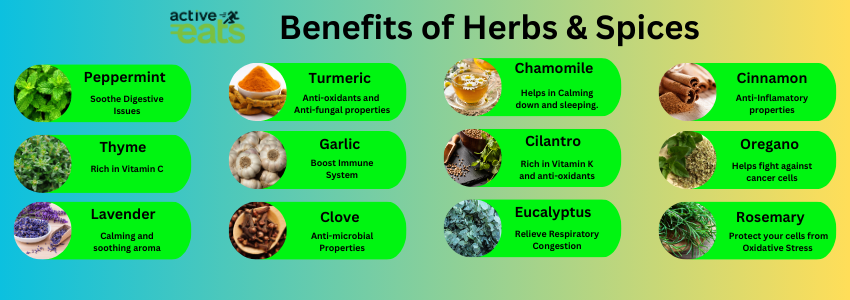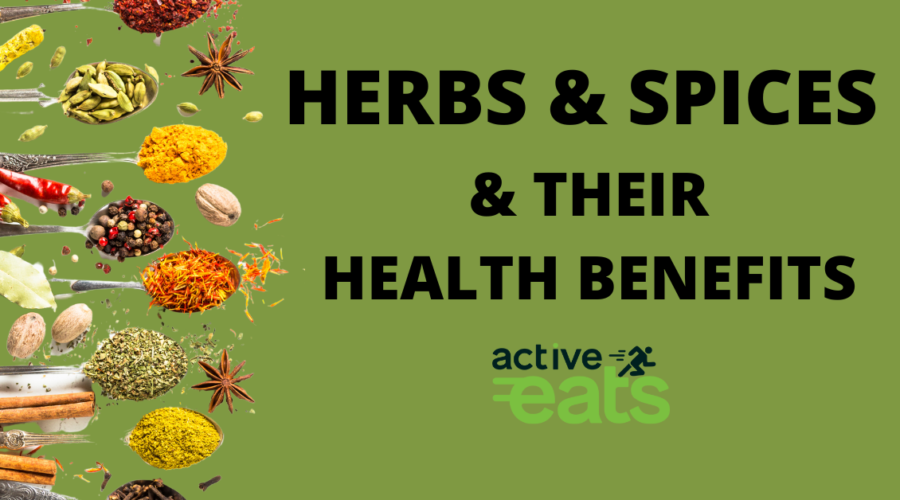Welcome to our blog post on the most beneficial herbs and spices! Herbs and spices not only add flavor to our dishes but also offer numerous health benefits. In this article, we will explore the difference between herbs and spices, discover the healthiest ones, unlock their benefits, and discuss their role in immunity, cancer prevention, weight loss, medicines, and their anti-inflammatory effects. So let’s dive in and learn more about the power of herbs and spices!
Herbs and Spices: The Difference
Herbs and spices differ in terms of the plant part they come from. Herbs typically come from the leaves of plants, while spices come from other parts like seeds, bark, or roots.
Another difference is in the flavor profile. Herbs have a milder taste and are often used to enhance the flavor of dishes, while spices have a stronger, more pronounced taste and are used to add depth and complexity to recipes. In terms of usage, herbs are commonly used fresh or dried, while spices are typically used in dried and powdered form. Both herbs and spices have been used for centuries in cooking, medicinal purposes, and for their aromatic properties.
Discover the Healthiest Herbs and Spices
- Some of the healthiest herbs include basil, parsley, cilantro, and rosemary. These herbs are rich in antioxidants, vitamins, and minerals that promote overall health.

- Among the healthiest spices are turmeric, cinnamon, ginger, and garlic. These spices have been shown to have anti-inflammatory and immune-boosting properties.

Incorporating these herbs and spices into your diet can help support a healthy immune system, improve digestion, and reduce inflammation in the body. It’s important to note that the health benefits of herbs and spices are best obtained when used in conjunction with a balanced diet and healthy lifestyle.
Unlocking the Benefits of Herbs and Spices
Herbs and spices offer a wide range of health benefits that can enhance your overall well-being. Here are some of the key benefits:

Incorporating a variety of herbs and spices into your meals can not only enhance the taste of your food but also provide numerous health benefits. However, it’s important to remember that herbs & spices should be used in moderation and in conjunction with a balanced diet and healthy lifestyle for optimal results.
Boosting Immunity with Herbs and Spices
Certain herbs & spices, such as garlic, ginger, and oregano, have been shown to have immune-boosting properties. These herbs & spices can help stimulate the production of white blood cells, which play a key role in fighting off infections and diseases.

Including immune-boosting herbs & spices in your diet can help strengthen your body’s natural defense mechanisms and prevent illness.
It’s important to remember that while herbs and spices can support immune health, a balanced diet and healthy lifestyle are also essential for overall well-being.
Fighting Cancer with Herbs and Spices

Some herbs and spices, such as turmeric, ginger, and garlic, have been studied for their potential anti-cancer properties. These herbs and spices contain compounds that have been shown to inhibit the growth and spread of cancer cells.
Incorporating cancer-fighting herbs and spices into your diet may help reduce the risk of certain types of cancer.
Herbs and Spices Beneficial for Weight Loss

Some herbs & spices, such as cayenne pepper, cinnamon, and green tea, have been shown to have metabolism-boosting properties. These herbs & spices can help increase calorie burning and promote weight loss when combined with a healthy diet and regular exercise.
Additionally, certain herbs & spices, like ginger and turmeric, have been shown to have appetite-suppressing effects.
Including weight-loss promoting herbs & spices in your meals can add flavor without adding excessive calories or unhealthy ingredients.
The Anti-inflammatory Effects of Herbs and Spices

Chronic inflammation is linked to various health conditions, including heart disease, diabetes, and arthritis. Many herbs & spices, such as turmeric, ginger, and cinnamon, have anti-inflammatory properties that can help reduce inflammation in the body.
These herbs and spices contain compounds that inhibit the production of inflammatory molecules in the body. Incorporating anti-inflammatory herbs & spices into your diet may help manage inflammation-related conditions and promote overall health.
Top 10 Powerful and Beneficial Herbs and Spices
- Turmeric: Renowned for its anti-inflammatory and antioxidant properties, thanks to curcumin. It’s a staple in Indian cuisine and has been linked to various health benefits, including joint health and cognitive function.
- Cinnamon: Beyond its delightful sweet aroma, cinnamon has been associated with improved blood sugar control and heart health. It adds warmth and depth to both sweet and savory dishes.
- Ginger: Known for its digestive properties, ginger can help alleviate nausea and inflammation. It’s commonly used in Asian and Indian cooking and can add a spicy, zesty kick to recipes.
- Garlic: This pungent herb is not only a culinary must-have but also boasts antibacterial and antiviral properties. It’s believed to support heart health and immune function.
- Oregano: Rich in antioxidants, oregano is a versatile herb that pairs well with Mediterranean and Italian dishes. It may also have antimicrobial properties and aid in digestion.
- Rosemary: With its aromatic, pine-like scent, rosemary is often used to enhance the flavor of roasted meats and vegetables. It contains compounds that may have cognitive and anti-inflammatory benefits.
- Cayenne Pepper: Adding heat to your dishes, cayenne pepper contains capsaicin, known for its potential to boost metabolism and reduce appetite. It’s also linked to pain relief when used topically.
- Basil: This aromatic herb is a staple in Italian cuisine and is rich in vitamins and minerals. It may have anti-inflammatory properties and is often used in pesto sauces and salads.
- Mint: Mint is well-known for its soothing properties, particularly for digestive discomfort. It’s also a refreshing addition to beverages, desserts, and Middle Eastern dishes.
- Coriander (Cilantro): Coriander leaves (cilantro) and seeds are both used in cooking. They add a fresh, citrusy flavor to dishes and have potential antioxidant and digestive benefits.
Conclusion
Incorporating herbs & spices into your diet can not only add flavor to your meals but also offer a wide range of health benefits. From boosting your immune system to fighting inflammation, herbs & spices have been used for centuries for their medicinal properties. However, it’s important to remember that these benefits are best obtained when used in conjunction with a balanced diet and healthy lifestyle. While herbs & spices can support overall health, they should not be used as a substitute for medical treatment. Always consult with a healthcare professional for personalized advice.

